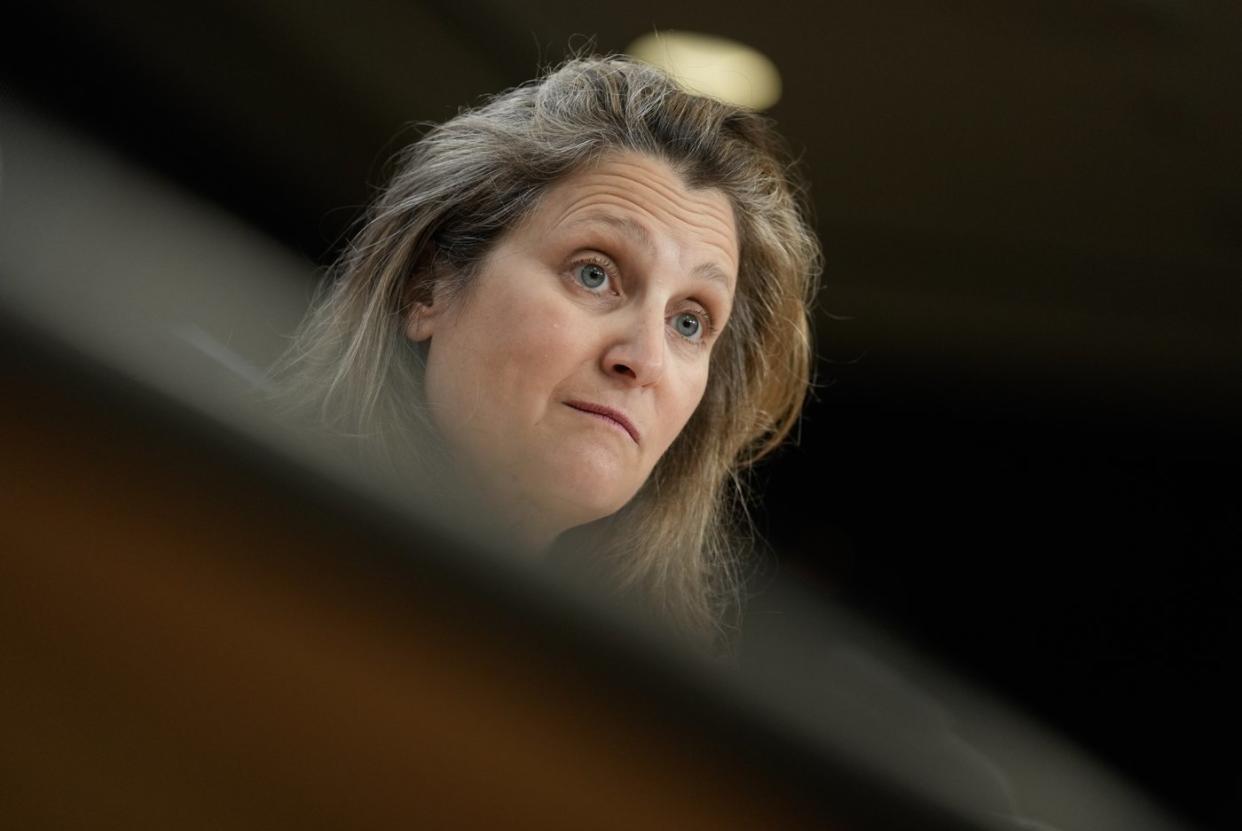Freeland says committee finding that some MPs aided foreign interference 'concerning'

OTTAWA — It is "concerning" that a parliamentary committee report says some Canadian MPs "wittingly" aided foreign state actors, but it is up to law enforcement to decide if they broke the law, Deputy Prime Minister Chrystia Freeland said Tuesday.
The National Security and Intelligence Committee released a report Monday following its study of whether foreign state actors interfered in the last two federal elections.
The report alleged that foreign interference had been detected across a broad swath of Canadian politics and society, including every level of government, every political party, the media and the private sector.
It also made explosive allegations that some MPs had "wittingly" participated in efforts by other countries to interfere in Canadian politics. In one case, an MP allegedly sought a meeting with a foreign intelligence official and gave that official confidential information.
The report suggested all the actions of the MPs involved were "unethical," and some could be considered illegal.
Freeland called the allegations "concerning."
"It is a serious, serious problem that there are MPs in our House of Commons who are part of this," Freeland said in French under questioning about the report at her weekly economic news conference Tuesday morning.
She did say that the Liberals are doing an "internal followup" as a political party but did not provide any detail about what that meant or if any Liberal MP who is accused would be allowed to remain in caucus.
But when pushed about why no charges have been laid or why the MPs in question aren't being named, Freeland said that's up to the police.
"I do really want to emphasize it needs to be law enforcement that takes the steps and takes the actions," she said. "The actual enforcement actions can't be politicized."
However, her Liberal colleague David McGuinty, the chair of the committee, said it's unlikely this will lead to criminal charges because of a conflict between the secretive nature of the evidence and the needs of the justice system.
While the names of the MPs were likely included in the full report, the paragraphs that would contain them were redacted from the version made public on Monday.
The Canadian Press has asked the RCMP if it is investigating any MPs as a result of the report. No response has yet been provided.
Public Safety Minister Dominic LeBlanc, who has responsibility for the foreign interference investigations, said Tuesday that it would be inconsistent with national security practice in Canada and among its allies to release the names of the MPs.
"I think Canadians need to know that the national security and intelligence agencies are doing the important work that they do," he said.
"I think Canadians understand that this work is done with a certain requirement of confidentiality and secrecy to protect sources and to protect the methods in which the intelligence agencies operate."
LeBlanc said some of the intelligence comes from allies who provide it with the caveat that it not be made public.
Those caveats may also prevent law enforcement from doing an investigation or laying charges.
The report itself warns that while some of the actions taken by individual MPs "may be illegal," they are "unlikely to lead to criminal charges."
That's because Canada hasn't "overcome the intelligence to evidence challenge in Canada," McGuinty said in an interview Monday.
That challenge is described in briefing notes provided to former public safety minister Marco Mendicino in 2023, as the "inherent tension between the need to protect sensitive information from disclosure, and the need to rely upon that information to support law enforcement and maintain procedural fairness in criminal, civil and administrative proceedings."
Procedural fairness includes ensuring the accused person can see the evidence used against them, so as to defend themselves.
Freeland and LeBlanc both insist the government has taken steps to protect Canada from foreign interference, though the report did not entirely agree.
It said the government has done the necessary policy work and gathered the intelligence it needs, but still has not implemented an effective response to counter foreign interference.
The Conservatives responded to questions about whether the MPs should be named by providing a statement from media relations director Sebastian Skamski.
“It is unacceptable that any parliamentarian would ‘wittingly’ aid a hostile foreign power to undermine our democratic process and elections, which every member of Parliament is sworn to protect," Skamski wrote.
He also said the report is further proof Prime Minister Justin Trudeau knew about foreign interference attempts and failed to act.
“If it wasn’t for Conservatives relentlessly calling for a full inquiry, Trudeau would have continued to get his way and deny that he has allowed foreign interference to run rampant in Canada under his watch," Skamski said.
Trudeau was forced to call a public inquiry into foreign interference last fall under pressure from all opposition parties. He initially insisted that a public inquiry would not work given the secretive nature of some of the evidence.
That inquiry held some public hearings but also reviewed secret documents.
An interim report released last month said that China had attempted to interfere in the 2019 and 2021 federal elections, but that it did not affect the overall results, which returned the Liberals to power with a minority government.
Justice Marie-Josée Hogue said the meddling may have affected the results in a small number of ridings, but there is no certainty about that and the overall integrity of the elections remained intact.
This report by The Canadian Press was first published June 4, 2024.
— With files from Anja Karadeglija and Jim Bronskill.
Mia Rabson, The Canadian Press

